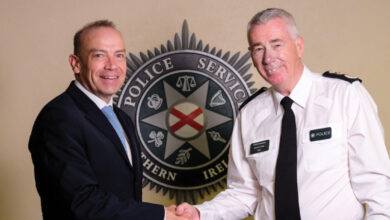Pressures on policing
 agendaNi summarises the PSNI’s financial situation and its plans to protect front-line services.
agendaNi summarises the PSNI’s financial situation and its plans to protect front-line services.
In one sense, the PSNI has the most generous policing budget in the UK. Per capita spending on maintaining public order in Northern Ireland was 63 per cent higher than the national average in 2012-2013. Around half of that difference is explained by the legacy of the past and the continuing terrorist threat. The other half is due to cuts to police budgets in Britain in recent years which the PSNI has mainly avoided.
Home Office funding for policing in England and Wales has fallen by a fifth since 2010. In the same timeframe, the PSNI was expected to save 6 per cent. The pace of cuts has increased to 7 per cent in this financial year (£50 million).
The scale of the financial pressures facing the PSNI in 2015-2015 will become clear in the coming months. Senior officers have – since last September – been highlighting the practical changes that the public can expect.
Chief Constable George Hamilton has outlined three main principles for making funding decisions:
1. keeping people safe today;
2. investing in technology to reduce spending; and
3. maintaining operational capacity and capability.
The most significant consequence is a reduction in community policing as PSNI officers are increasingly taking on office duties – including six suspended officers on limited duties. This started towards the end of last year when 300 temporary staff were laid off. A reactive ‘blue light service’ will disappoint the public but the PSNI emphasises that this shift will be necessary to protect public safety.
Opening hours at most major police stations have been reduced to a maximum of 12 hours per day. Musgrave Street (Belfast) and Strand Road (Derry) will be open to the public 24/7. However, this will only affect a small proportion of the public as almost all enquiries come in by phone or online.
The non-emergency 101 line has been a particular success since its introduction in January last year and has received 470,000 calls to date. It’s much more recognisable than the previous number (0845 600 8000) and has helped officers to prioritise calls more effectively. 999 should be used when a life is endangered, a crime is in progress, a suspect is nearby, or violence is being threatened.
In terms of structures, the PSNI will increase the number of policing districts from eight to 11 to align these with the new council areas in April. A single Assistant Chief Constable (Stephen Martin) is now responsible for all district policing.
Custody suites have been closed in West Belfast, Lisburn and Ballymena and the savings will be used to redeploy officers and modernise the other suites. The Historical Enquiries Team was closed and replaced by the smaller ‘cold case’ unit. The Stormont House Agreement is expected to deliver £150 million to handle legacy cases over the next five years: to be sub-divided between the Historical Investigations Unit and the Independent Commission on Information Retrieval.
A review of police resilience found that the PSNI needed to have 6,953 officers in post. As of January, the strength of the service was 6,813. Around 380 officers were to be recruited over the course of 2014-2015 but the final figure is now likely to be lower. More details on the future shape of policing will be outlined in the Chief Constable’s monthly reports to the Policing Board over the course of this year.





